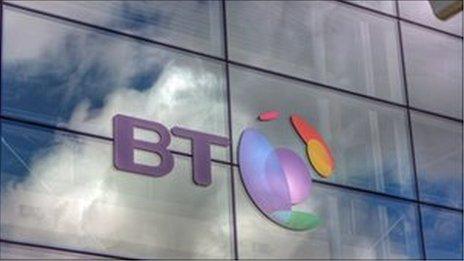BT’s competitors plot regulatory backlash
- Published
- comments

With BT's management working feverishly to complete a £10bn deal to buy a mobile telephone company, it is worth noting that their competitors are unlikely to sit idly by and watch the deal go through.
As has been widely reported, BT is close to entering the key "exclusivity" stage of the deal to buy either O2 (22 million mobile phone customers in the UK) or EE (24.5 million).
The "exclusivity" stage is the bit when a company agrees it wants to buy a target and enters talks with that target alone to seal the deal.
Of course, as with any deal, it could fall at the final hurdle but the noises today are positive.
For what this might mean for consumers, read my earlier blog on the issue here.
I argued then that any deal would probably mean cheaper bills in the long run, creating a significant headache for other mobile operators which already operate with wafer-thin profit margins.
Sources tell me that the BT board is caught in a dilemma over the deal.
Buying O2 is easier. It only has one owner, Spain's Telefonica, which is a willing seller.
And it will be cheaper as it has fewer customers.
EE is seen by many, though, as strategically more compelling for BT.
It leads the market in 4G (the fastest mobile bandwidth) which many think is the future for smartphone service delivery.
But EE has two owners - France's Orange and Germany's Deutsche Telekom - which makes any deal trickier.
Buying EE will also be considerably more expensive and EE's 4G position may raise regulatory issues.
BT successfully bought 4G spectrum in the last auction of 2013.
Bringing that together with EE may make the Competition and Markets Authority and Ofcom (the two lead regulators for the sector) twitchy.
It may not be the only thing.
'Competition is good'
Vodafone, Sky, Virgin, Talk Talk and 3 - the other major players in this market - will all be watching developments closely.
One of the biggest worries, I am told, is over what is known as "backhaul" services.
That's the vital bit of the telecoms infrastructure that links mobile transmission masts with the mobile operator's network.
It's run by BT Wholesale.
Now, if there is a deal that could raise concerns as BT would then be running its own mobile business through the "piping" that is also owns.
The second issue is more fundamental.
How should the telecommunications sector be regulated in a "quad-play" world where major operators like BT could ultimately provide mobile, broadband, fixed line and television services?
At the moment the four parts of the "quad" are largely regulated as if they are separate sectors.
It's a system of "vertical" regulation.
But what if that were to change to "horizontal" cross-media regulation? Again, if the deal goes through, BT would become a major player in each of the quad areas.
Its mobile and television competitors are likely to make some regulatory noise about that.
My BT sources say that any issues are easy to overcome and that BT would not be dominant in any of the key markets.
One told me that competitors might make a lot of noise, but that's because they don't like the thought of a new competitor.
"Competition is good for the market and consumers," the source said.
As a counter to that, mobile operators are pointing to the example of New Zealand.
There the major provider, Telecom, split to become a retail business - which retained the name - and a network delivery business, called Chorus (which plays the BT Wholesale role).
We are a long, long way from similar developments here.
But it is certainly worth remembering that telecommunications is a fast developing sector dealing with the rapidly evolving world of digital.
How that world changes if this deal goes through - and how that affects all of us and how we live online - will be much debated as BT flexes its considerable corporate muscles.